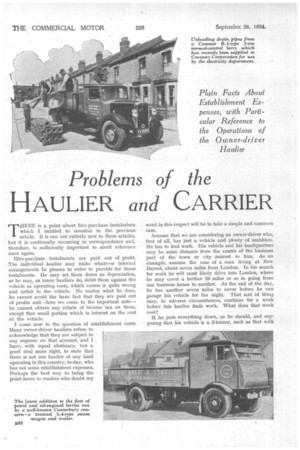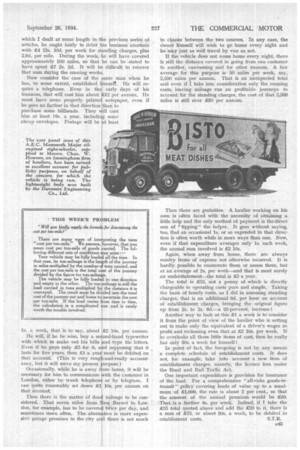Problems of the
Page 54

Page 55

If you've noticed an error in this article please click here to report it so we can fix it.
HAULIER and CARRIER THERE is a point about hire-purchase instalmCnts which I omitted to mention in the previous article. It is one not entirely new to these articles, but it is continually occurring in correspondence and, therefore, is sufficiently important to merit reference once again.
Hire-purchase instalments are paid out of profit.
he individual haulier may make whatever internal arrangements he pleases in order to provide for those instalments. He may set. them down as depreciation, or he may, as many hauliers do, debit them against the vehicle as operating costs, which course is quite wrong and unfair to the vehicle. No matter what he does, he cannot avoid the basic fact that they are paid out of profits and—here we come to the important note— he cannot obtain any rebate of income tax on them, except that small portion which is interest on the cost of the vehicle.
I come now to the question of establishment costs. Many owner-driver hauliers refuse to acknowledge that they are subject to any expense on that account, and I have, with equal obstinacy, but a good deal more right, to state that there is not one haulier of any kind operating in this country, to-day, who has not some establishment expenses. Perhaps the best way to bring the point home to readers who doubt my word in this respect will be to take a simple and common case.
Assume that we are considering an owner-driver who, first of all, has just a vehicle and plenty of ambition. He has to find work. His vehicle and his headquarters may be some distance from the centre of the business part of the town or city nearest to him. As an example, assume the case of a man. living at New Barnet, about seven miles from London. In his search for work he will most likely drive into London, where he may cover a further 20 miles or so in going from one business house to another. At the end of the day, he has another seven Miles to cover before he can garage his vehicle for the night. That sort of thing may, in adverse circumstances, continue for a week before this haulier finds work. What does that week cost?
If he puts everything down, as he should, and supposing that his vehicle is a 2-t,onner, such as that with which I dealt at some length in the previous series of articles, he ought fairly to debit his business atcohnts with 24 13s. 10d. per week for standing charges, plus 2.9c1. per mile. During the week, he will have covered approximately 200 miles, so that he can be stated to have spent £7 2s. 2d. It will be difficult to recover that sum during the ensuing weeks.
Now• consider the case of the ante man when he has, to some extent, established 1 inaserf. He will require a telephone. Even in th early days of his business, that will cost him about 12 per annum. He must have some properly printe a notepaper, even if he goes no farther in that direction than to purchase some billheads. They '1 cost him at least I0s. a year, inclu some cheap envelopes. Postage will be t least is. a week, that is to say, about
He will, if he be wise, buy a se with which to make out his bills Even if he pays only 25 for it, a lasts for five years, then 21 a ye that account. (This is very roug ancy, but it will, serve my present
Occasionally, while he is away necessary for him to communicate London, either by trunk telephon can quite reasonably set down 21 that account. 22 10s. per annum. and-hand typewriter rid type his letters. d supposing that it must be debited on -and-ready accounturpose.) am home, it will be ith the customer in or by telegram. I 10s. per annum on Then there is the matter of dea sidered. That seven miles from don, for example, has to be cover sometimes more often. The altern sive garage premises in the city a mileage to be con7 eW. _Barnet to Loutwice per day, and five is more expend there is not much to choose between the two courses. In any case, the owner himself will wish to go home every night and he may just as well travel by van as not.
. If the vehicle does not come home every night, there is still the distance covered in going from one customer to another, canvassing and for other reasons. A fair average for this purpose is 50 miles per week, say, 2,500 miles per annum. That is an unexpected total and even if I take into consideration only the running costs, leaving mileage run on profitable journeys. to account for the standing charges, the cost of that 2,500 miles is still over £30 per annum.
Then there are gratuities. A haulier working on his own is often faced with the necessity of obtaining a little help and the only method of payment is the direct one of "tipping" the helper. It goes without saying, too, that an occasional is. or so expended in that direction is often worth while in more ways than one. Now, even if that expenditure averages only is. each week, the annual sum involved is £2 10s. .
Again, when away from home, there are always sundry items of expense not otherwise incurred. It is hardly possible to enumerate them or assess them, but at an average of 2s. per week—and that is most surely an understatement—the total is £5 a year.
The total is 255, not a penny of which is directly chargeable to operating costs pure and simple. Taking the basis of hourly costs, as I did in assessing standing charges, that is an additional Gel, per hour on account of establishment charges, bringing the original figure up from 2s. to 2s. 6(1,---a 25-per-cent. increase!
Another way to look at this El. a week is to consider it from the point of view of the haulier who is setting out to make only the equivalent of a driver's wages as profit and reckoning even that at 22 10s. per week. If he overlooks all these little items of cost, then he really has only 30s. a week for himself !
In point of fact, the foregoing is not by any means a complete schedule of establishment costs. It does not, for example, take into account a new item of establishment charges, namely, the licence fees under the Road and Rail Traffic Act.
• One important 'expenditure is provision for insurance
of the load. For a comprehensive " goods-intransit" policy covering loads of value up to a maximum of 21,000, the rate is about 2 per cent., so that the amount of the annual premium would be 220.
• That is a further Ss. per week. Indeed, if I take the 2,55 total quoted above -and add the 220' to it, there is a sum of 275, or about 30s. a week, to be debited_ to establisment costs.




















































































